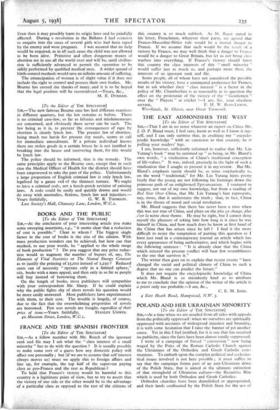BOOKS AND THE PUBLIC
[To the Editor of THE SPECTATOR] Slit,--At the conclusion of your interesting article you make some sweeping assertions, e.g., "it seems clear that a reduction of cost is possible." Clear to whom ? The biggest single factor in the cost of books is the size of the edition. With mass production wonders can be achieved, but how can that method, to use your words, be " applied to the whole range of book production " ? Do you suggest that any price reduc- tion would so augment the number of buyers of, say, The Elements of Vital Statistics or The Neural Energy Constant as to justify the printing of 25,o0o instead of 1,250 ? Reduced costs can of necessity " operate only in a limited sphere," viz, books with a mass appeal, and then only in so far as people will buy instead of borrowing them.
On the length of books, most publishers will sympathise with your correspondent Mr. Sharp. If he could explain why the public fights shy of short novels his question would be more easily answered. Most publishers have experimented with them, to their cost. The trouble is largely, of course, due to the fact that the ovenvhebning proportion of novels are borrowed. Few new novels are bought, regardless of their
price of issue.—Yours faithfully, STANLEY UNWIN. 40 Museum Street, London, W.C.r.


































 Previous page
Previous page